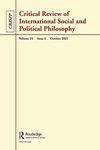The shallow ecology of public reason liberalism
IF 1
Q3 POLITICAL SCIENCE
Critical Review of International Social and Political Philosophy
Pub Date : 2023-11-25
DOI:10.1080/13698230.2023.2286879
引用次数: 0
Abstract
In this article, I shall contend that Rawlsian public reason liberalism (PRL) is in tension with non-anthropocentric environmentalism. I will argue that many reasonable citizens reject non-anthropocentric values, and PRL cannot allow them to be used as the justification for ecological policies. I will analyse attempts to argue that PRL can incorporate non-anthropocentric ideas. I shall consider the view, deployed by theorists such as Derek Bell and Mark A. Michael, that PRL can make a distinction between constitutional essentials and non-essentials, and therefore ecocentric values can be employed when only non-essentials are at stake. I will also consider Simon Hailwood’s argument that PRL can incorporate concern for nature based on its ‘otherness’. I shall conclude that both positions fail to rebut the claim that PRL excludes non-anthropocentric viewpoints. I will consider the question of whether PRL’s exclusion of non-anthropocentric ethics is a problem, and I shall show that appealing to purely anthropocentric arguments leads to a variety of unpalatable conclusions. I will suggest that comprehensive liberalism can include non-anthropocentric concerns, and hence is superior from an environmental perspective.公共理性自由主义的浅薄生态
在本文中,我将论证罗尔斯的公共理性自由主义(PRL)与非人类中心主义的环境主义之间的矛盾。我将论证,许多通情达理的公民拒绝非人类中心主义的价值观,而公共理性自由主义不能允许这些价值观被用作生态政策的理由。我将分析那些试图论证 PRL 可以纳入非人类中心主义思想的观点。我将考虑德里克-贝尔(Derek Bell)和马克-迈克尔(Mark A. Michael)等理论家提出的观点:PRL 可以区分宪法的基本要素和非基本要素,因此当只有非基本要素受到威胁时,可以采用生态中心主义价值观。我还将考虑西蒙-海尔伍德(Simon Hailwood)的论点,即 PRL 可以基于自然的 "他者性 "纳入对自然的关注。我的结论是,这两种立场都无法反驳 PRL 排斥非人类中心主义观点的说法。我将考虑 PRL 排斥非人类中心主义伦理学是否是一个问题,并将证明诉诸纯粹的人类中心主义论点会导致各种令人不快的结论。我将提出,全面自由主义可以包含非人类中心主义的关切,因此从环境的角度来看是优越的。
本文章由计算机程序翻译,如有差异,请以英文原文为准。
求助全文
约1分钟内获得全文
求助全文
来源期刊

Critical Review of International Social and Political Philosophy
POLITICAL SCIENCE-
CiteScore
1.60
自引率
0.00%
发文量
74
 求助内容:
求助内容: 应助结果提醒方式:
应助结果提醒方式:


